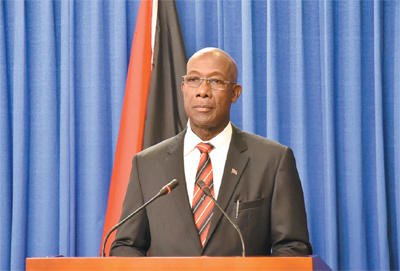(Trinidad Guardian) Against the backdrop of current low energy prices and a dismal fiscal projection, Prime Minister Dr Keith Rowley’s first address to the nation held a few glimmers of hope.
In his almost 30 minute delivery, Rowley touched on the previous government’s financial failings, but quickly moved on to his Government’s intended plan of action.
One of those plans is to split the billion dollar Heritage and Stabilsation Fund into two “distinct parts” and utilise one portion of it.
“We intend to leave the bulk of the existing fund in the Heritage component and allocate the remainder to the Stabilisation Fund. We intend to use approximately US$1.0 billion for stabilisation purposes in FY 2016 and perhaps another US$0.5 billion in FY 2017,” Rowley said.
While the HSF remained untouched for years, Rowley said it was being saved for this rainy day.
“The circumstances we now face are precisely those which were envisaged for the use of the Stabilisation Fund and we will utilise it rather than increase the country’s debt levels unnecessarily,” he said.

Another key component of the plan moving forward is to keep T&T away from the International Monetary Fund (IMF) and a promise to ramp up home construction through a partnership with the private sector. Rowley outlined a merger between the Trinidad and Tobago Mortgage Finance and the Home Mortgage Bank to help provide financing for new home owners.
“We will encourage housing construction by the private sector and simultaneously, we will accelerate the implementation of the Trinidad and Tobago Mortgage Bank through the merger of the TTMF and the Home Mortgage Bank to provide the financing for the mortgages for those new homeowners,” he said.
Rowley said access to the private sector in the construction industry would save Government initial capital investment in the housing sector.
“The objective here is to quickly move private capital into the housing market to service a sector which forms the HDC client base without initial state cash outlay. The private developers should be motivated to get into the programme bringing finance in the expectation of a better return on capital than is easily available elsewhere and the state would get the job done whilst stimulating the economy without too much up-front capital coming from the state,” Rowley said.
It will also help with job creation.
“New home construction and building maintenance will sustain employment of plumbers, carpenters, masons and electricians,” he said.
He said unemployment relief programmes, like CEPEP, were expected to continue, but with an expanded range. He said those programmes would have to be examined to eliminate corruption and make them more efficient and effective.
“The Ministries of Local Government and Rural Development, Urban Development, Works and Agriculture will have a determining role in some of the projects to which this expenditure can be targeted with a decent ratio between material and labour,” he said.
Those ministries will have to accomplish that with a seven per cent adjustment to their respective operating expenses.
“The Minister of Finance will direct the management of every state enterprise, statutory body and each Ministry and the Tobago House of Assembly to review their operations and make identifiable adjustments of seven per cent reduction in proposed operating expenses, eliminating waste and/or inefficiencies, not relating to job cuts at this instance,” Rowley said.
Greater role for central bank
The Prime Minister outlined a specific watchdog role for the Central Bank, in light of its “renewed confidence”.
The Central Bank…will work closely with the Ministry of Finance to ensure that fiscal, monetary and exchange rate policies are aligned through effective cooperation and collaboration between the Central Bank and the Ministry, and will adjust these policies as they deem appropriate,” he said.
Spending less forex
The Prime Minister is also urging the nation to conserve its use of foreign exchange.
He said the Government planned to continue making investments and even projected an increase in that investment activity.
“Especially where there is greater incentive to earn foreign exchange. Our exporters of manufactures and services should continue to do as well or better during the period of adjustment, and some of those businesses may even increase employment,” he said.
Rowley said T&T has “already used up almost US$2 billion of our foreign exchange reserves in 2015” and laid most of that responsibility at the door of the Central Bank.
“Unfortunately, the Central Bank saw it fit to make foreign exchange cheaper in the face of falling export earnings and reduced inflows of foreign exchange and also opened up new channels for outflows of foreign exchange other than the traditional channels through the commercial banks,” he said.
Rowley said that in addition to that, “Government expenditure continued unabated and even accelerated in the run up to the General Election, thus fueling even greater demand for foreign exchange in a period of heightened political uncertainty.”








